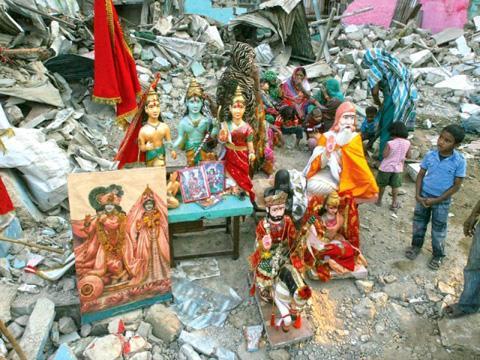Mumbai, There is great sense of persecution and insecurity among Hindu minority in Pakistan and Bangladesh. The deprived community is outrageous over growing radicalism, religious intolerance and discrimination. It is said that if you want to break someone, simply attack on his beliefs and faith. Religious places of Hindu minorities are easy targets for extremists to oppress them. In recent years, both Bangladesh and Pakistan witnessed number of incidents of attacks on temples.
More than 108 Hindu temples, 244 idols and 1,500 Hindu houses were destroyed in 20 districts during pre and post poll violence in Bangladesh. The Hindu-Buddhist-Christian Unity Council (HBCUC), a major forum of minority communities, in its report said: “Since the election schedule was announced on November 25, 2013, a total of 495 Hindu houses were damaged, 585 shops were attacked or looted and 169 temples were damaged”.
Bangladesh Nationalist Party (BNP), Hefazat-e-Islam and Jamat-e-Islami were indulged in attacks. The attacks were widely condemned on international platform. Human Rights NGOs such as Amnesty International, Human Rights Watch and Bangladesh Human Rights Commission expressed serious concerns over pathetic condition of Hindu minority.
Though Prime Minister Sheikh Hasina took tough stand against perpetrators taking several steps to grill them and assure the Hindus who are passing through the horrific situation.
It is alleged that the persecution of Hindus is a part of Jamat-e-Islami’s bigger conspiracy to convert Bangladesh into a monotheist Islamic country to take revenge for the defeat of 1971.
Attacks on Hindu temples in Bangladesh
The pain of Pakistani Hindus is not different. This largest community among minorities is outrageous over attacks and demolition of temples. In January 2014, a police constable guarding a Hindu temple at Peshawar was shot dead by two assailants in broad day light. The demolition of 100-year-old Shri Rama Pir Mandir in Karachi in December 2013 triggered massive protests by the minority. Shockingly, the builder demolished the pre-partition temple and Hindus’ houses, despite petition pending in court seeking a stay on such a move. Unfortunately, alleged hands and gloves of strong builder lobby and local authorities remained blind and deaf while bulldozer crushed religious sentiments of Hindus. The 160-year-old Gorakhnathtemplewhich was re-openedafter 60 years in 2011, was vandalized thrice by unidentified men in 2012.
At the time of partition there were around 300 temples in Pakistan. At present hardly three dozen have managed to survive. Most of the temples were looted, attacked and vandalized over a period of time. Most Hindu temples are non-existent while idols in many ancient temples of historical importance are missing. Reports suggest that the government has denied permission to install new ones in place of these.
The famous Temples at Katas, near Kalar Kahar, Doodhwali Mata Mandir and the Sheetla Mandir in Lahore, The Sheetla Mandir at Lahore, Parahlad Mandir and Jain Mandir near Anarkali in Lahore are some of the temples which are in urgent need of renovation.
Most of the temples are closed to Hindus and the premises are being used for other purposes. According to reports, one of the Katas temples in Pakistan has even been converted into a library. The famous Parahlad Mandir and Jain Mandir have been locked and an Islamic school being run in its compound.
Pakistan Hindu Seva Welfare Trust’s (PHS) Vice-President Chander Kohli said: “The present condition of religious temples in Pakistan is the same as there is no security to temples. Most of the managements of religious temples in Pakistan have to arrange their own security during any event of religious celebration. In the previous times, the issues of demolishing temples were raised but nothing happened for their security and any culprit who demolished temples is not given any punishment.”
He said: “In the past no incident has occurred at any temple in Pakistan but it can’t be expected that nothing will happen in future too”.

Prominent Hindu Temples in Pakistan
The persecution of Hindus in Pakistan is outcome of the process of “Islamization” under military dictator Zia-ul-Haq in 1978. He pushed to convert secular laws into religious ones, installing Sharia courts and enacting anti-blasphemy statutes. Through the 1990s and 2000s, conservative Islamic movements gainedcultural and political sway, subverting the region’s open approach to faith.
Talking on growing religious intolerance with News Bharati, Chander said, “There are some extremists who don’t want any other religion to survive. Due to such radicalism in Pakistan many Hindu families have left Pakistan and are migrated to India, United Kingdom, United Arab Emirates or Canada.”
He said, “The government of Pakistan should immediately increase the security of all temples in Pakistan. And the concerned police officers of the area should also coordinate with the management of temples. The government of Pakistan should arrange security for them as Hindus are the first largest minority of Pakistan.”
Another prominent organization working for Hindus has demanded the appointment of Hindu on Evacuee Trust Property Board to protect their properties.
Gopal Khamuani, Joint Secretary of Pakistan Hindu Council (PHC) told News Bharati: “This is our right to control all ancient Hindu properties who have left before partition”.
Despite of being treated as third grade citizen, Hindu minority in Pakistan and Bangladesh have kept their culture and tradition alive. Ironically, Human Rights activists, NGOs and even media who are otherwise outspoken on minority rights of other communities, go soft when suppose to speak on atrocities of Hindus. Hindu groups have now united for their rights and raising voice against inequality. They are fighting for justice at all fronts.






























